Welcome to the August 2017 issue of the Global Washington newsletter.
IN THIS ISSUE
- Letter from our Executive Director
- Issue Brief: The Transformative Power of Education, Especially for Girls
- Featured Organization: Rwanda Girls Initiative
- Changemaker: Mahnaz Javid, Mona Foundation
- Welcome New Members
- GlobalWA Member Events
- Career Center
- GlobalWA Events
Letter from our Executive Director
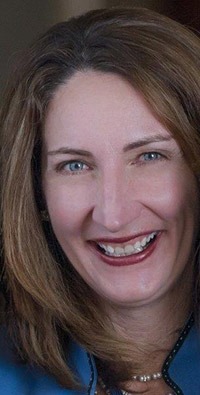
My daughter will be starting kindergarten in the next few weeks and is filled with excitement and curiosity. Education gives kids a chance to understand their place in the universe and how to make sense of the world around them. Research has shown us again and again that making sure young people have access to quality education has a transformative impact on their lives. And ensuring that girls as well as boys have that same opportunity has an even greater impact on the health and prosperity of their communities.
In this month’s issue, we’ve highlighted various Global Washington members that are serious about expanding quality education in developing countries, including the Mona Foundation and Rwanda Girls Initiative, which are sharply focused on empowering young women.
We also explore the way in which the metrics that are chosen impact the success of education programs in developing countries – such as evaluating the quality of the education, rather than just tracking enrollment rates. Many organizations believe that it is not enough just to educate a child if she is not able to make a lasting contribution to her society. Learn more in the articles below about how our members are prioritizing education that addresses the needs of the whole student.
Similarly, a video interview we did with the founder of Ashesi University Foundation, lays out the importance of educating youth to be strong moral leaders, people who set an example for others to follow. We look forward to exploring more with you at our annual conference what it truly means to be a global leader.
Enjoy the last weeks of summer, and I hope to see you all this fall.

Kristen Dailey
Executive Director
Issue Brief
The Transformative Power of Education, Especially for Girls
By Tom Murphy
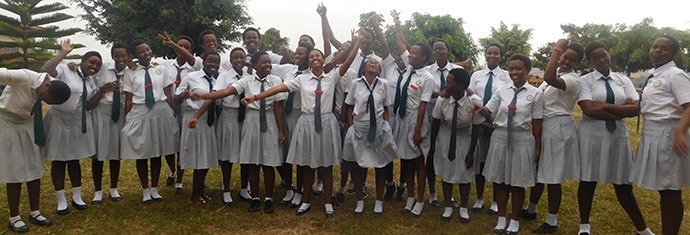
Photo credit: Rwanda Girls Initiative
How powerful is education? Some 171 million people could be lifted out of extreme poverty if every student in low-income countries finished school with basic reading skills, according to The United Nations Educational, Scientific and Cultural Organization (UNESCO).
It is particularly important for girls. Research shows that an additional year of schooling can raise future wages for a woman by up to 20 percent. Girls who complete primary education are less likely to become teen mothers. Nearly 200,000 maternal deaths could be avoided if all girls completed primary education, according to one study. Other benefits include fewer child marriages, lower rates of HIV/AIDS and gains in gender equity.
“I have travelled the world and met people in many countries,” Malala Yousafzai said to the Canadian Parliament in April.
“I’ve seen firsthand many of the problems we are facing today — war, economic instability, climate change and health crises. And I can tell you that the answer is girls. Secondary education for girls can transform communities, countries and our world.”
The problem is that too many children are not going to school. More than 264 million children around the world are out of school – 130 million are girls. They range from the Syrian refugees living in Lebanon, to the children of subsistence farmers in rural Rwanda.
The good news is that more children go to school today that at any point in human history. The number of children not attending primary school fell by half between 2000 and 2013, despite a growing global population. It is an impressive feat.
But more money is needed if the world wants to achieve the goal of providing quality pre-primary, primary and secondary education to every child by 2030. Current spending falls short by $39 billion per year, according to the Global Partnership for Education. The group provides assistance to the countries with the greatest number of children out of school and is trying to increase its annual spending to $2 billion a year – still a fraction of the total needed to achieve universal education.
There is also more work to be done to ensure children not only go to school, but they learn while in the classroom. Students in some countries graduate primary school unable to read simple text nor perform basic arithmetic. Harvard University research Lant Pritchett has tracked the problem for years and even wrote a book on the problem.
“Schooling, however, is not the same as education,” Pritchett says. “Few of these billion students will receive an education that adequately equips them for their future. The poor quality of education worldwide constitutes a learning crisis.”
One major problem is the priority placed on getting children into the classroom. The Millennium Development Goals, a set of global goals aimed at reducing problems associated with poverty, only called for increases in enrollment. The newly adopted Sustainable Development Goals address the problem by including targets aimed at addressing problems like teacher quality and increased access to vocational training. They also emphasize the importance of girls’ education, namely calling for the elimination of gender disparities in education by 2030.
There is still a lot at stake when it comes to global education. It is hard to overstate the power of education in reducing poverty and inequity. Education can do many things beyond basic learning. For example, it helps lower youth unemployment and it can reduce discrimination against indigenous children.
Education alone cannot solve all of the world’s problems, but it is a crucial part to the wider solution.
“If we want to reduce armed conflict and stem irregular migration flows, equitable access to quality education is essential,” Julia Gillard, former Australian Prime Minister and Chair of the Global Partnership for Education said in May.
“Quality education for all matters whether you are a business leader searching for talent, a security analyst fretting over the risk of conflict, a voter who worries about rising numbers of asylum seekers, or a feminist who admires Malala’s courage. I am convinced that people everywhere are able to embrace the education agenda.”
***
Many Global Washington members are working toward improving education for young people, especially girls and young women, around the world.
Ashesi University Foundation mobilizes support for Ashesi University in Ghana. Ashesi’s mission is to educate a new generation of ethical and entrepreneurial leaders in Africa and cultivate within its students the critical thinking skills, concern for others and courage it will take to transform their continent. Founded in 2002 by Ghanaian Patrick Awuah, Ashesi offers majors in Computer Science, Business Administration, MIS, and Engineering, all grounded in a liberal arts core curriculum. Ashesi plans to broaden its impact by growing to 1,000 students by 2020 and adding new programs, while maintaining their strong culture of ethics and critical thinking. Ashesi is seeking partners to continue to expand their impact in Africa.
Founded in 2004, the Bo M. Karlsson Foundation (BMKF) awards higher education scholarships to underprivileged women in Nepal, empowering them to become confident, self-reliant, vital citizens in their communities and country. Over the past decade, BMKF has awarded scholarships to 45 young women who have gone on to pursue careers in accounting, business management, engineering, journalism, law, medicine, nursing, public health, rural development, social work and teaching — futures that were hopelessly out of reach before receiving scholarships to pursue their undergraduate degrees. As the majority of BMKF scholars come from remote villages, most of them are the first in their families to receive any education. Several scholars have a physical disability, belong to marginalized castes or ethnic groups, or have experienced harrowing civil war and human trafficking situations. All share a passion for education. BMKF is committed to helping them succeed.
Kobi Academy
Kobi Academy’s mission is to provide exceptional education that empowers children in Ethiopia to be creative, achievement oriented, compassionate citizens committed to life-long learning and community stewardship.
Mission Africa believes that education is the key to ending generational poverty and that investment in education can have a profound impact on communities. Many African countries do not offer free education and Mission Africa is dedicated to ensuring that all children regardless of their income level have access to quality education. In the past ten years, Mission Africa’s academic scholarship program has awarded 795 scholarships and has allowed more than 300 students in rural villages in Nigeria, Tanzania, Kenya, Sierra Leone, Togo, Rwanda and Uganda to graduate high school and continue on to college or vocational training. Mission Africa has also shipped 10 40-foot containers filled with books and school supplies to children and families in Nigeria, Kenya and Tanzania.
Since its founding in 1999, Mona Foundation has had a simple but compelling goal — to support grassroots educational initiatives that build stronger and sustainable communities by raising the status of women and girls. Mona achieves this by partnering with local organizations and investing in the education of children and youth and women. Mona selects initiatives that are initiated and implemented by the local community and have a proven record of success. A long-term partnership enables sustained social and economic development activities, which often leads to an increase in reach, greater efficacy of programs, and an expanded ability to address complex problems. Mona partners with organizations that work to reduce the barriers to education, improve quality of learning and cultivate agency among girls and boys. Programs use an integrated approach to develop academic skills, and creative and moral capabilities of their participants and transform individuals to become agents of change in service to their families and communities. As a result, young people gain competency, agency, integrity and a commitment to building socially just communities. Mona Foundation has awarded more than $10 million in support to 35 initiatives in 18 countries, providing access to quality education and training for more than 246,000 students, teachers and parents annually. For 2016 Mona supported partner organizations in the U.S., Haiti, Panama, Brazil, Vietnam, China, Mongolia, and India.
NPH USA supports Nuestros Pequeños Hermanos (Spanish for “Our Little Brothers and Sisters”) which is raising more than 3,400 orphaned, abandoned and disadvantaged boys and girls in Bolivia, the Dominican Republic, El Salvador, Guatemala, Haiti, Honduras, Mexico, Nicaragua and Peru. NPH believes that a quality education is the key to a better life. Many children arrive at NPH with little or no formal schooling. Each child is given a strong foundation of basic academic and interpersonal skills and provided with an extensive variety of educational opportunities. Nearly all of NPH homes feature on-site schools from Montessori preschool through middle or high school, as well as vocational trade certification courses. In 2015, NPH supported 369 students in university – the most in the organization’s history. Children grow up to become accountants, carpenters, doctors, farmers, mechanic, nurses, teachers and community leaders. An additional 2,100 children who live in low income areas outside the homes receive scholarships to attend NPH schools. Click here to see stories of nine children who are learning in different ways at NPH.
Rwanda Girls Initiative’s mission is to educate and empower girls in Rwanda to reach their highest potential. The organization’s vision is for students to graduate as inspired young leaders, filled with confidence, a love of learning and a sense of economic empowerment to strengthen their communities and foster Rwanda’s growth. The Gashora Girls Academy of Science and Technology (GGAST) is an innovative and socio-economically diverse model upper-secondary STEM school designed to provide a “whole girl” education. GGAST provides a rigorous college prep academic program, combined with leadership training and extra-curricular activities that fills girls with confidence so they can pursue their dreams of university education and impactful vocations. Since opening GGAST’s doors in January 2011, Rwanda Girls Initiative has educated 270 girls each year with a 93 percent matriculation rate to universities in 16 countries, including 153 in the U.S. and Canada with over $30 million in scholarships. Educate a girl. Inspire a community. Transform a nation.
Sahar provides access to education in Afghanistan and supports an educated future for Afghan girls, enabling them to actively participate in social, political and economic arenas in their communities. Sahar builds schools, computer centers and teacher training programs utilizing local labor and community support. Since 2009, Sahar has invested over $2 million in building, repairing and supplying schools in Afghanistan, a country in which 45 percent of schools operate without adequate buildings. Sahar operates 13 schools, 9 rural and 4 urban, and 87 classrooms have been built or renovated. Sahar impacts 20,000 girls annually and serves girls from Uzbek, Tajik, Pashto and Hazar ethnic groups. In total, Sahar’s programs have impacted more than 200,000 girls.
Schools for Salone partners with local villages in Sierra Leone, West Africa, to rebuild the schools devastated in the ten-year civil war that ended in 2002. The organization has built 16 schools and two libraries since 2005.
SE Asia Foundation emphasizes education for girls, provides hands-on coaching for sustainability, and complies with the Istanbul Principles, ensuring religious inclusion. In Myanmar, Cambodia and Thailand, the Foundation supports girls’ education from preschool to university.
The Rose International Fund for Children
The Rose International Fund for Children (TRIFC) is transforming education for blind students in Nepal. Being a blind or visually-impaired student in a developing country is an incredible challenge. There are no areas of these student’s educational and personal needs that are properly covered with the limited funding provided by the Nepal government. Add to that the societal stigma attached to having a disability, where one is considered to be cursed or suffering from a past-life sin and the result is a neglected, marginalized group with a devastating loss of human potential. TRIFC is working to solve this problem through an innovative, holistic program which addresses all areas of need and provides students with the necessary tools to be successful in school and in life. TRIFC is working to enhance personal and educational support in the areas of health, hygiene, nutrition, school tools for the blind, daily-living skills and more.
West African Vocational Schools
West African Vocational Schools’ (WAVS) mission is to create hope and opportunity in West African communities by working hand-in-hand with indigenous leaders to establish vocational training centers and economic development programs, while sharing the Gospel message.
In rural developing countries, the biggest barrier to education is often the physical act of getting to school. Tasked with many more domestic chores than boys, girls fall behind because of the cultural obstacles they face. In many of the areas where World Bicycle Relief works, it is common for girls to arrive at school late and tired if they arrive at all. By providing bicycles to children, especially girls, they empower girls with knowledge and ultimately, change the course of their lives. Keeping girls in school has been shown to have a multiplier effect that can help break the cycle of poverty.
Featured Organization
Rwanda Girls Initiative
By Tom Murphy
The Gashora Girls Academy of Science and Technology, located in the East African country of Rwanda, provides girls the opportunity to access a world class secondary school education regardless of their family income. The school and additional support provided to the girls is the result of the Rwanda Girls Initiative (RGI), based in Kirkland, Washington.
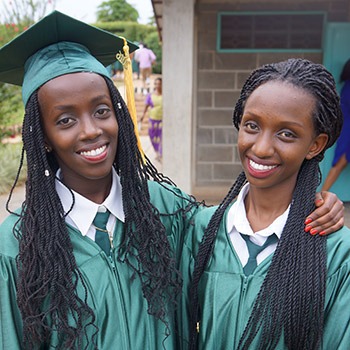
Photo credit: Rwanda Girls Initiative
“We met so many girls who desperately wanted to continue their schooling, but the opportunities were very limited,” Shalisan Foster said. “Even the girls who did continue to secondary school were burdened by household chores and safety concerns – so they tended to drop out at a higher rate than the boys.”
Foster and Suzanne Sinegal McGill founded RGI in 2008 as the result of consultations with people living throughout Rwanda. Construction started soon after on a community center which opened in 2010 and the school opened in January 2011. Today, some 270 girls attend the school annually and there are already graduates attending universities across the world, including at least one student attending every Ivy League school.
The boarding school is more than just a center for learning. RGI takes a “whole girl” approach – providing support for the girls’ health and social development. The school offers extracurricular and leadership programs to further its broader goals, and the girls who graduate are prepared for life beyond the classroom.
“It is easy to fall in love with the school based on girls’ empowerment, educating girls in Africa and more,” Hillary Carey, Chief Business Officer at RGI said “But learning more about the country and history and the true intentions of RGI captured my heart.”
Rwanda is still rebuilding in the wake of its 1994 genocide that nearly 1 million people killed in 100 days. It was the result of ethnic divides created by Belgium in the early 20th century when it controlled the country. An additional 2 million people fled the country as refugees, an event that transformed an entire generation. It left a post-colonial independent country that was already struggling with high rates of poverty in an even worse position.
Despite the challenge, the country made remarkable gains in reducing poverty and improving health in the more than two decades since the genocide. It is one of Africa’s fastest growing economies over the past decade. It is also one of a few countries in the world where women make up more than half of the parliament. What’s more, it cut extreme poverty from 77 percent of the country in 2000, to 10 percent today.
However, the gains lag in some areas – notably secondary education. More than 95 percent of Rwandan children go to primary school, up from 78 percent in 1999. Yet, the figures drop off significantly for secondary school, with only 27 percent of age eligible students enrolled.
The rates are even lower for girls and fall further when they are from rural areas of the country. In the end, only eight percent of Rwandan girls graduate from secondary school. RGI’s school seeks to address that problem. But graduating more girls is not enough. By focusing on science, technology, engineering and math (STEM) they hope to nurture the next generation of scientists, social entrepreneurs, advocates and thought leaders in Rwanda.
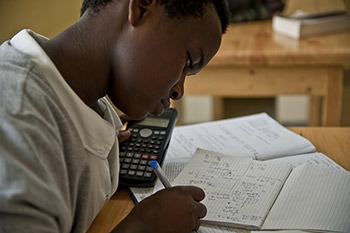
Photo credit: Rwanda Girls Initiative
Student composition is another important part of RGI. The organization boasts the most socio-economically diverse school in Rwanda. The student body is currently made up of girls from 27 of Rwanda’s 30 districts, as well as girls from neighboring Burundi and Somaliland. The diversity is an intentional decision that aims to fulfill RGI’s goal of empowering the next generation of leaders.
Motivating the girls turned out not to be difficult. Students are up at 5 AM studying before classes each day, Carey said. In fact, the school has to enforce a strict lights-out policy at 10 PM because many of the girls are still up doing school work. In one case, a girl contracted malaria shortly before the important national exams – a test necessary for graduation and university placement. She did not let the parasite get in her way and still took the test.
“They are warriors in that way,” Carey said. “They won’t let things get in their way or get them down.”
RGI now looks to the future. The start-up phase that lasted since its founding is ending and programming is underway that will focus on longer term goals. These include thinking about how to continue support for the girls when they finish school. And there is an effort to transition to local governance of the school on the ground, another example of the drive to ensure that the program is accountable to the community.
Changemaker
Mahnaz Javid, Mona Foundation
By Tom Murphy
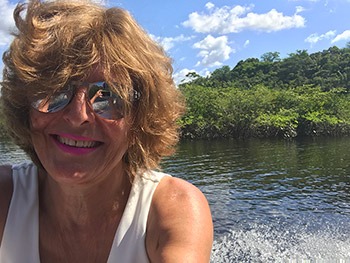
Selfie on the Amazon river in Brazil. Photo credit: Mahnaz Javid
It does not take long into a conversation with Mahnaz Javid for her personal ethos to emerge.
“We have a lot more in common than our differences, and the more we recognize it, the more we can come together as one people to build a better world for all of our children” she says.
Javid is driven to make a difference in her community. She founded the Mona Foundation two decades ago, believing that “there is no such thing as self-development. Self-development happens only in service to others.”
The idea for the foundation came together on the back of a napkin over lunch with two friends at a social and economic development conference in Orlando in 1998. Javid saw that it was possible to make a real difference in the lives of many with just a little help and resources – especially when it came to education of children and the empowerment of girls.
“Development data shows that education and gender equality are top two pre-requisites to alleviating global poverty,” she said.
Mona Foundation supports grassroots educational initiatives that provide education to all children, increase opportunities for women and girls, and emphasize service to the community. Their goal is to alleviate global poverty and support community-led transformation such that no child ever goes to bed hungry, or is lost to preventable diseases, or is deprived of the gift of education for lack of resources.
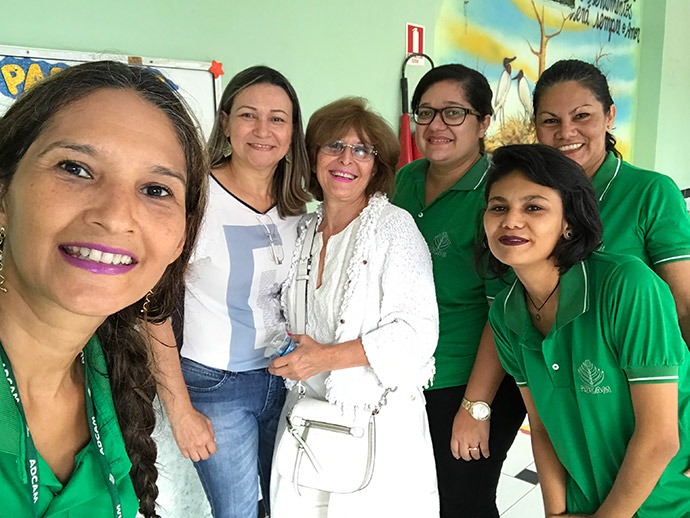
Mahnaz with teachers from the Association for Cohesive Development of the Amazon (ADCAM). Started in 1985 as a small orphanage, ADCAM today is a nationally-recognized institution, which offers K-12, a technical college, vocational training, a family development center and rural education programs serving over 1,000 students, and 4,400 youth, families and elderly a day. Photo credit: Mahnaz Javid.
Mona Foundation believes that the keys to alleviating poverty are universal education, gender equality, and community building. The Foundation also believes that each person, regardless of economic status, has the right, the capacity and the responsibility to be the protagonist of the process of their own development, and contribute to the betterment of their communities.
“Social change is not a project that one group of people carries out for the benefit of another. Change can only emerge from within a community and belongs to the people and institutions that are implementing the effort,” Javid says. “Education is the light that you turn on in a dark room. It lets you see, removes prejudices and darkness, and gives you the freedom to choose your path forward to be better and give back to your community.”
While the basis for the foundation was sketched out in 1998, the ideas driving Javid were formed at a young age. She grew up in Iran with parents who were always willing to help others. Her father, a physician, dedicated himself to treating the poor. And her mother was so benevolent that she gave more to other people than to her own children, Javid joked.
She also saw the poverty and challenges faced by others in her native land and as she travelled around the world. “A mother is a mother, is a mother. We all love our children, we all want the best for our kids, and none of us wants to see our kids go to bed hungry or sick because we cannot afford healthcare.” The thought of Mona Foundation started to take shape as she pursued her PhD and her advisor encouraged her to write her dissertation about her passion.
“I thought the one thing I was willing to do without pay and do it my whole life was to give back to other people,” she explained.
The Mona Foundation is the embodiment of that passion. Since 1999, it has provided $10 million in support to 35 projects in 18 countries, impacting the lives of thousands. Programs include direct school support for communities in Brazil along the Amazon River, education and skills training for girls in India, assistance to schools in Haiti and more.
Mona Foundation’s focus is more than just providing access to academic education, Javid explained. Mona supports educational programs that offer holistic education to develop academic, creative and moral capabilities of their students and transform individuals to become agents of change in service to their families and communities.
“Giving and caring is intrinsic to our humanity. It defines who we are as a people and helps us to be the best we can be. So, education should help us do great academically – be mathematicians, scientists, doctors, teachers – but it also should give us the skills and capabilities we need to participate in the betterment of our communities. Without giving back and service to the community, we cannot be whole, and nothing will ever change for the better around us,” Javid says.
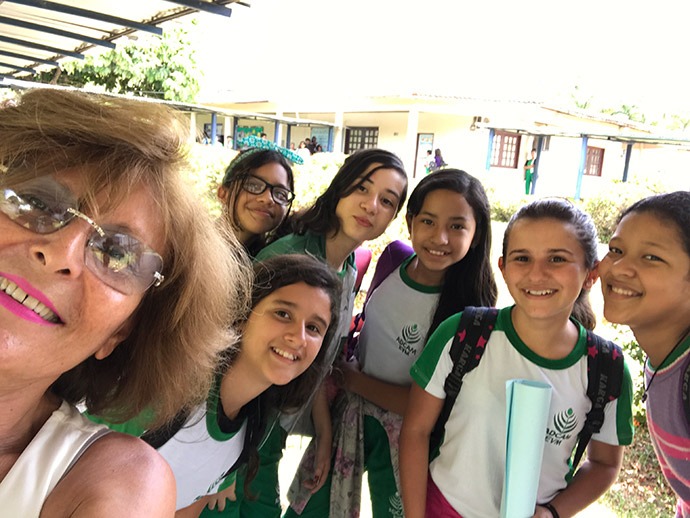
Mahnaz with students at the Association for Cohesive Development of the Amazon (ADCAM). Photo credit: Mahnaz Javid.
Visible change happens in all the projects that Mona supports because the foundation identifies promising local educational initiatives at the grassroots and accompanies them long-term to help them put their plans into action. The effect of this strategy of long-term partnership has been dramatic. Several of their partner projects have been built from quite humble beginnings to full-fledged, effective, and well-recognized educational institutions, serving thousands of students, teachers and parents.
More than 1,300 teachers in Mongolia were trained, thanks to the foundation. It supports the Mongolian Development Center, a preschool program with more than 40 schools serving 7,500 students across the country. The schools believe that children learn best through the modeling of their parents, so it provides services that help all adults in a child’s life support the learning process.
“Every person regardless of who they are has the capacity, right and responsibility to give back to write their own future – it is not our role as the funding agency to tell others how to do it.”
Welcome New Members
Please welcome our newest Global Washington members. Take a moment to familiarize yourself with their work and consider opportunities for support and collaboration!
Forum One
Forum One is a full service agency that works with mission-driven organizations to create the stunning designs, smart messaging, and custom-built technology tools they need to realize their goals and change the world. forumone.com
Street Business School by BeadforLife
Street Business School creates transformation for people living in poverty through building confidence and igniting entrepreneurial skills. For more than a decade, we’ve empowered Ugandan women to discover their own entrepreneurial potential and leave poverty behind. Today, we’re scaling to ignite potential in 1 million women around the world by 2027. www.beadforlife.org/streetbusinessschool
Member Events
Aug 17: Days for Girls // Bee Her Hero Charity Event
Aug 26: Days for Girls // Girls Soar
Sep 9: Extend the Day // Lights for Learning
Sep 23: Spreeha // Journey of Hope Dinner and Fundraiser
Career Center
Community Events Coordinator, World Affairs Council
Partnership Development, PotaVida
Head of Marketing Strategy, PATH
For more jobs and resources, visit https://globalwa.org/job-board/
GlobalWA Events
August 24: Happy Hour with Friends of GlobalWA and World Affairs Council
September 8: Voices from the Field: ACT for Congo
November 29: GlobalWA Annual Conference – Renewing Global Leadership